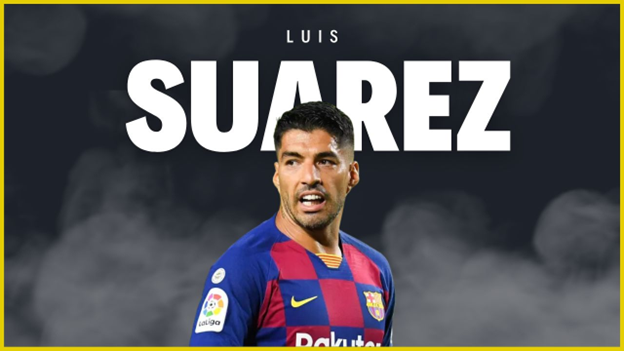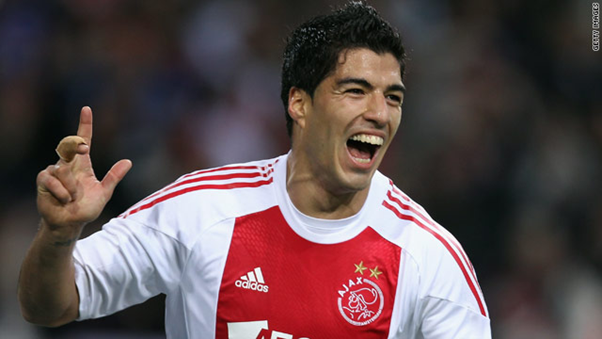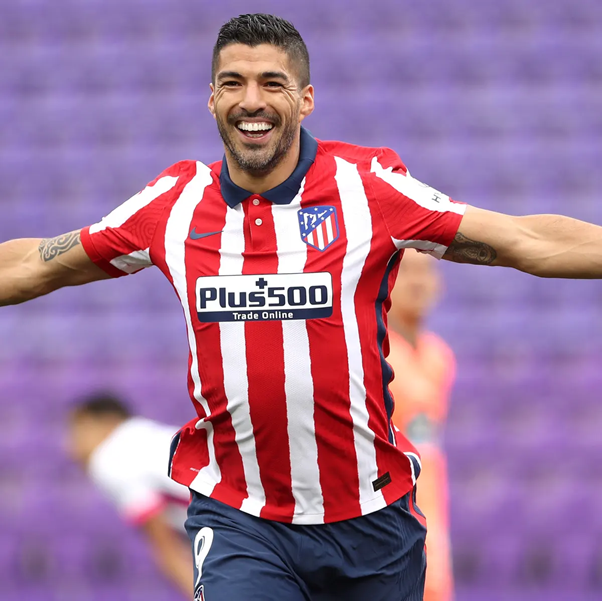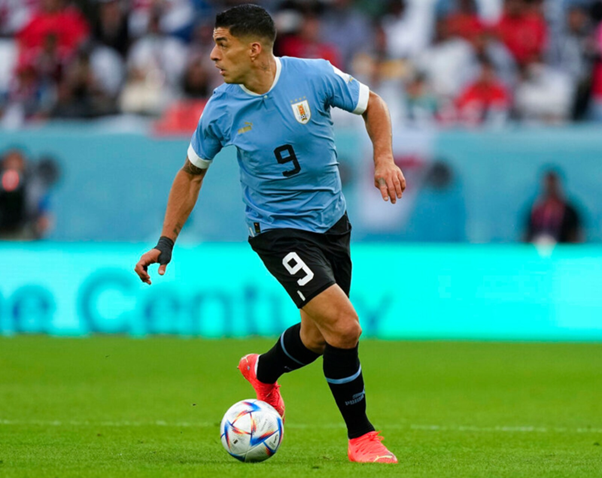Luis Suárez Bio Data
| Full Name | Luis Alberto Suárez Díaz |
| Nick Name | El Pistolero |
| Father’s Name | Rodolfo Suárez |
| Mother Name | Sandra Diaz |
| Profession | Footballer |
| Playing position | Striker |
| Date of Birth | 24 January 1987 |
| Age | 36 Years |
| Birthplace | Salto, Uruguay |
| Nationality | Uruguayan |
| Eye Colour | Brown |
| Hair Colour | Black |
| Religion | Roman Catholic |
| Zodiac Sign | Aquarius |
| Gender | Male |
| Height | 5′ 11 |
| Weight | 81 kg |
| Siblings | 7 Brothers & 1 Sister |
| Marital Status | Married |
| Wife Name | Sofia Balbi (M. 2009) |
| Children | 2 Son and 1 daughter |
| Children Name | Benjamin, Delfina Suarez and Lautaro Suárez |
| Net Worth | $70 million |
Luis Suárez Introduction
Luis Alberto Suárez Díaz, a Uruguayan professional footballer, excels as a striker for the Uruguay national team. Known as El Pistolero (‘The Gunman’), his amazing talents for passing, finishing, and ball control define him in football. Suárez, celebrated as one of the best players of his generation, is also recognised as one of the greatest strikers in football history.
His famous career has been honoured with many awards, including two European Golden Shoes, an Eredivisie Golden Boot, a Premier League Golden Boot, and the coveted Pichichi Trophy. Suárez has scored over 500 goals in his club and international career, showing his consistency and skill.
Luis Suárez Parents
Luis Suárez’s parents, Rodolfo Suárez and Sandra Salgueiro, have been important in his journey to success. Rodolfo, a retired factory worker, and Sandra, a dedicated housekeeper, always supported their children’s desires. They particularly supported Luis’s ambition to become a professional football player, celebrating his achievements with pride. Their constant support and mentoring shaped Luis’s career.
Luis Suárez Siblings
Luis Suárez, the renowned footballer, comes from a family with seven siblings. His older brother, Paolo Suárez, was also a professional football player. Paolo had a successful career in Uruguay, playing for top clubs like Nacional, Peñarol, and Defensor Sporting. It shows that talent for football runs in their family. Every sibling plays an equally important role, focusing on her family’s well-being and upbringing. Each sibling, in their way, has carved out a unique and meaningful life.
Luis Suárez Personal Life
Luis Suárez is married to Sofía Balbi, a dynamic Uruguayan model and entrepreneur. Sofía, who runs her “Sofia Balbi” clothing line, has been a significant figure in Luis’s life. The couple’s love story started in their teens in Uruguay, blossoming into a deep relationship. They began dating in 2003 and tied the knot in 2009, marking the start of a beautiful partnership both in life and career.
Luis Suárez Children
Luis Suárez and his wife, Sofía Balbi, are thrilled to be parents of three children. Their oldest, Delfina Suárez, was born in 2010. The couple welcomed their son, Benjamín Suárez, in 2013. The youngest child, Lauti Suárez, was born in 2018. Suárez is not just a celebrated footballer; he’s also a loving dad. Luis shows his softer side by cherishing his kids during family time. He posts images of his children on social media to express his joy in fatherhood. Aside from sports, Suárez is a family man who enjoys every parenting moment.
Luis Suárez’s Playing Career
Luis Suárez, is a famous footballer playing for FC Barcelona and the Uruguay national team. He started his career in Uruguay with Nacional in 2005, then moved to Groningen in the Netherlands in 2006. In 2007, Luis joined Ajax Amsterdam, impressing everyone with his skills. His big break came in 2011 when he transferred to Liverpool, becoming a top striker and winning the European Golden Shoe.
In 2014, Suárez joined Barcelona, forming a strong trio with Messi and Neymar and achieving great success, including winning a continental treble. Internationally, he’s been crucial for Uruguay, helping them win the 2011 Copa América. Despite his success, Suárez is known for some controversial behaviour on the field. He also has a sponsorship deal with Adidas.
Ajax
In 2007, Suárez joined Ajax on a five-year contract for €7.5 million. He quickly made an impact, scoring in his league debut and twice in his first home game at Amsterdam Arena. Ajax finished second in the league that season, with Suárez scoring 17 goals. The next season, under coach Marco van Basten, Suárez was talented but got many yellow cards. He faced suspensions, including one for a fight with Albert Luque.
In 2009, Martin Jol became head coach and named Suárez as captain. Suárez excelled, scoring multiple goals in several matches, including a record six in one game. He finished as the league’s top scorer with 35 goals and was named Ajax Player of the Year and Dutch Footballer of the Year. However, his time at Ajax also had controversies. He was banned and fined for attacking an opponent in a match in 2010, receiving the nickname “Cannibal of Ajax.”
Liverpool
Luis Suárez joined Liverpool from Ajax in January 2011 for £23 million. He was expected to play alongside Fernando Torres, but Torres moved to Chelsea, and Liverpool then brought in Andy Carroll. In the 2011/12 season, Suarez faced an eight-game ban for allegedly racistly abusing Patrice Evra of Manchester United, which he denied. In 2012/13, he led Liverpool in scoring with 23 goals.
However, he was banned again for biting a Chelsea player, Branislav Ivanovic. It was his second biting incident, having previously bitten Otman Bakkal at Ajax. In the 2013/14 season, Suarez stayed at Liverpool after a failed transfer to Arsenal, scored 31 goals, and won the Golden Boot. Liverpool nearly won the title but finished second to Manchester City. At the season’s end, Suarez signed a five-year deal with Barcelona.
Barcelona
Luis Suárez joined Barcelona from Liverpool in 2014 for €82.3 million. He was initially suspended due to an incident during the World Cup. Suárez, alongside Messi and Neymar, formed the ‘MSN’ trio, leading Barcelona to numerous victories, including the 2015 Champions League. Suárez became the top scorer in Spain in 2016. Despite further successes, Barcelona faced challenges, particularly in European competitions. The departure of Neymar in 2017 marked the end of the ‘MSN’ era. Barcelona continued to dominate in Spain but struggled internationally. In 2020, amidst financial difficulties, Suarez left Barcelona, scoring 195 goals in 283 games, and moved to Atletico Madrid.
Atletico Madrid
In September 2020, football player Luis Suarez joined Atletico Madrid, coached by Diego Simeone, on a two-year contract. He teamed up with Diego Costa, another famous striker. His move upset some at Barcelona, especially Lionel Messi. Suarez quickly became one of the top scorers in La Liga, playing a key role in Atletico’s strong performance. In his first season, he scored 21 goals in 32 games, helping Atletico win their first La Liga title in seven years. The next season, Suarez scored 11 goals, and Atletico finished third. After his contract ended, Suarez returned to his first club, Nacional, in July 2022, scoring in his first game back.
Luis Suarez’s International Career With Uruguay
Playing for Uruguay, Luis Suarez became famous during the 2010 World Cup. He had stopped a Ghana goal that may have made them the first African team in the semis. Uruguay then lost in the semi-finals and the third-place match. They won the Copa America in 2011. In the 2014 World Cup, Suarez bit Italy’s Giorgio Chiellini and got a four-month ban. He was part of the 2016 Copa America team but didn’t play much due to injury. Suarez also played in the 2018 World Cup and the 2019 and 2021 Copa Americas, but Uruguay was eliminated in the quarter-finals each time. He scored four goals in the qualifiers for the 2022 Qatar World Cup.
List of International Goals Scored by Luis Suárez
| Date | Opponent | Score | Competition |
| 13 October 2007 | Bolivia | 1-0 | FIFA World Cup qualification |
| 18 November 2007 | Chile | 1–0 | FIFA World Cup qualification |
| 6 February 2008 | Colombia | 2–2 | Friendly |
| 25 May 2008 | Turkey | 1–0 | Friendly |
| 28 May 2008 | Norway | 1–1 | Friendly |
| 10 June 2009 | Venezuela | 1–1 | 2010 FIFA World Cup qualification |
| 9 September 2009 | Colombia | 1–0 | 2010 FIFA World Cup qualification |
| 10 October 2009 | Ecuador | 1–1 | 2010 FIFA World Cup qualification |
| 3 March 2010 | Switzerland | 2–1 | Friendly |
| 22 June 2010 | Mexico | 1–0 | 2010 FIFA World Cup |
| 26 June 2010 | South Korea | 1–0 | 2010 FIFA World Cup |
| 8 October 2010 | Indonesia | 2–1 | Friendly |
| 8 June 2011 | Netherlands | 1–0 | Friendly |
| 4 July 2011 | Peru | 1–1 | 2011 Copa América |
| 19 July 2011 | Peru | 1–0 | 2011 Copa América |
| 24 July 2011 | Paraguay | 1–0 | 2011 Copa América |
| 7 October 2011 | Bolivia | 1–0 | FIFA World Cup qualification |
| 11 November 2011 | Chile | 1–0 | FIFA World Cup qualification |
| 25 May 2012 | Russia | 1–0 | Friendly |
| 10 June 2012 | Peru | 1–0 | FIFA World Cup qualification |
| 16 October 2012 | Bolivia | 1–4 | FIFA World Cup qualification |
| 14 November 2012 | Poland | 3–1 | FIFA World Cup qualification |
| 22 March 2013 | Paraguay | 1–0 | FIFA World Cup qualification |
| 5 June 2013 | France | 1–0 | Friendly |
| 16 June 2013 | Spain | 1–2 | FIFA World Cup qualification |
| 23 June 2013 | Tahiti | 7–0 | FIFA World Cup qualification |
| 14 August 2013 | Japan | 3–0 | Friendly |
| 6 September 2013 | Peru | 1–0‡ | FIFA World Cup qualification |
| 15 October 2013 | Argentina | 2–1 | FIFA World Cup qualification |
| 19 June 2014 | England | 1–0 | FIFA World Cup qualification |
| 13 October 2014 | Oman | 1–0 | Friendly |
| 13 November 2014 | Costa Rica | 1–1 | Friendly |
| 25 March 2016 | Brazil | 2–2 | FIFA World Cup qualification |
| 6 September 2016 | Paraguay | 3–0 | FIFA World Cup qualification |
| 11 October 2016 | Colombia | 2–1 | FIFA World Cup qualification |
| 10 October 2017 | Bolivia | 3–1 | FIFA World Cup qualification |
| 23 March 2018 | CzechRepublic | 1–0 | 2018 China Cup |
| 7 June 2018 | Uzbekistan | 2–0‡ | Friendly |
| 20 June 2018 | Saudi Arabia | 1–0 | FIFA World Cup qualification |
| 25 June 2018 | Russia | 1–0 | FIFA World Cup qualification |
| 7 September 2018 | Mexico | 2–1 | FIFA World Cup qualification |
| 7 June 2019 | Panama | 2-0 | FIFA World Cup qualification |
| 16 June 2019 | Ecuador | 3–0 | Copa América |
| 20 June 2019 | Japan | 1–1 | Copa América |
| 18 November 2019 | Argentina | 2–1 | Friendly |
| 8 October 2020 | Chile | 1–0‡ | FIFA World Cup qualification |
| 13 October 2020 | Ecuador | 1–4‡ | FIFA World Cup qualification |
| 13 November 2020 | Colombia | 2–0‡ | FIFA World Cup qualification |
| 21 June 2021 | Chile | 1–1 | Copa América |
| 14 October 2021 | Brazil | 1–3 | FIFA World Cup qualification |
| 27 January 2022 | Paraguay | 1–0 | FIFA World Cup qualification |
| 1 February 2022 | Venezuela | 4–0‡ | FIFA World Cup qualification |
| 29 March 2022 | Chile | 1–0 | FIFA World Cup qualification |
Luis Suárez’s Primary Records
- With 35 goals in 33 games, he broke the record as the KNVB Cup’s leading scorer in 2010.
- He scored his 100th goal for the Ajax during the 2010–11 campaign.
- He and the team won the Football League Cup in February 2012.
- He was awarded PFA Player of the Year and FWA Footballer of the Year in April 2014.
- He has won the Premier League Golden Boot.
- He is the all-time top scorer for Uruguay, scoring 45 goals in 84 games.
- He was named Player of the Tournament at the 2011 Copa America after scoring four goals to help Uruguay win the competition.
- He scored his 300th goal for club and nation in October 2015.
- Suárez became the first player since 2009 to win both the Pichichi Award and the European Golden Shoe, behind Messi and Ronaldo.
- Suárez is considered to be among the world’s top scorers.
Luis Suárez’s Net Worth
The famous Uruguayan football player Luis Suarez Net Worth is estimated to be $70 million as of 2023.








